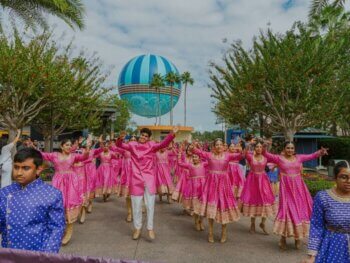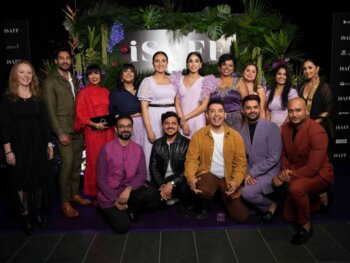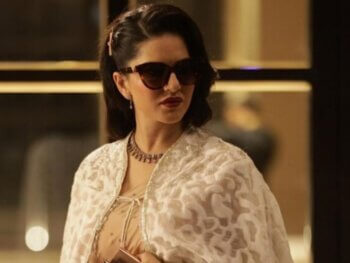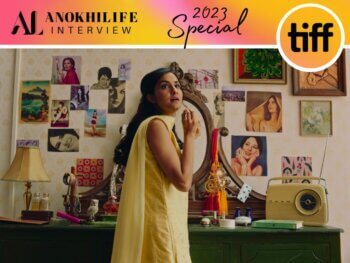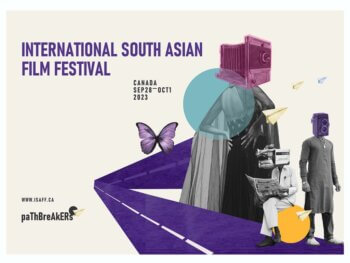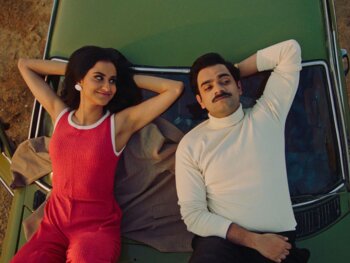
TIFF 2019: Priyanka Chopra Jonas, Farhan Akhtar & Shonali Bose Dish On ‘The Sky Is Pink’
Entertainment Oct 11, 2019
During The Toronto International Film Festival, I sat down with stars Priyanka Chopra Jonas (who also c0-produced the film through her Purple Pebble Pictures), Farhan Akhtar and director Shonali Bose to chat about bittersweet TIFF 2019 dramedy The Sky Is Pink, which opens in theatres across North America today, Friday October 11, 2019.
Toward the end of this past September’s Toronto International Film Festival, Priyanka Chopra Jonas and Farhan Akhtar lent the fest a bit of their high-voltage Bollywood star power, arriving in the city to promote director Shonali Bose’s bittersweet dramedy The Sky Is Pink. Based on the true story of teen motivational speaker/author Aisha Chaudhary (My Little Epiphanies), the film is narrated by a beyond-the-grave Aisha (Dangal‘s Zaira Wasim), who takes us through the tumultuous three-decade journey of her parents, Aditi (Chopra Jonas) and Niren (Akhtar), as they first fight to save their gravely ill daughter, then resolve to fill her remaining years with as many singular life experiences as possible, and finally, figure out how to come to terms with her passing.
In the back room of King Street’s ultra-swanky Coffee Oysters Champagne, ANOKHI LIFE got the chance to sit down with Chopra Jonas, Akhtar and Bose to talk about crafting a film that’s uplifting yet authentic — one that each of them, particularly Chopra, felt a deeply personal connection to.
Matt Currie: Is there a key to making a movie that’s inspirational and heartwarming without being maudlin?
Shonali Bose: I think for me it’s grounding your actors and your writing in honesty and authenticity. I never like to be melodramatic, so if you just keep them honest, be real, and don’t be filmy or actory, that’s what’s going to be honest and hit somebody’s heart vs. when you’re sentimentalizing. It’s not just about acting, it’s about writing. In your writing, can you be truthful and keep it bare-bones?
MC: Priyanka, in what ways did this role challenge you?
Priyanka Chopra Jonas: I’m not good at dealing with goodbyes. I hadn’t dealt with my dad’s death as much as I thought I had, maybe? I was very close with my father. We were friends, he was my champion. So I think this one especially pushed me as an actor, because what I was feeling was very, very real. This film, there were scenes that went back home with me, they haunted me, they made me think about the unnaturalness of losing a child, and the depth of that and the grief of that.

MC: What does this film have to say about life and death?
PCJ: Damn, that’s a big question!
SB: It’s really about the life lived. [Aisha] had only five years [left] to live, and her parents’ approach to that was, we will make every moment count. “We could also die tomorrow. Fuck death. We’re going to do everything possible and amazing and go over every mountain.” She could hardly breathe for 60 seconds, and they took her snorkelling; they put breadcrumbs out so beautiful fish would come. They did everything so that she could have every single beautiful moment that she could. That’s, I think, amazing as parents; that’s one of the things that inspired me.
And for me, I brought something of myself to this film that the parents didn’t have and don’t have, which is an acceptance and lightness around death. I have the character Aditi — which is not what she did in real life, but I did at my son’s funeral — wear beautiful, vibrant clothes; she celebrated the death day of her daughter, the funeral. And I don’t mean “celebrated her life.” She understood [as] I understood that my son’s journey has ended, and it doesn’t matter that it ended earlier than I thought it should, it has ended and that is fantastic. He had an amazing journey, he gobbled up life. My son gobbled up life and so did Aisha. So you celebrate that they’ve crossed the finish line of the marathon.
MC: Priyanka, it seems like the film presents a unique challenge, and maybe a unique opportunity, to play one character in various phases of her life, from her 20s to her 50s, seeing through older eyes and younger eyes, with the perspectives all jumbled together . . .
PCJ: I have done it in the past where I’ve aged through the production of a picture. But what is most difficult when you do that is, scheduling doesn’t think about actors [laughs]; scheduling thinks about how to finish the film fastest, most efficiently. I’m a producer and an actor in this movie, so I kind of had to understand both. But I think the hardest is when you have to play two different ages within the same day. That’s crazy. You play 25 and then suddenly you’re 55; my 25-year-old character has not experienced everything the 55-year-old has. That’s usually really hard. As an actor, I know the entire story of their lives, but the 26-year-old doesn’t, the 36-year-old doesn’t, the 48-year-old doesn’t. How much do they know about what’s happening? To be aware and unaware was a challenge, but super fun!
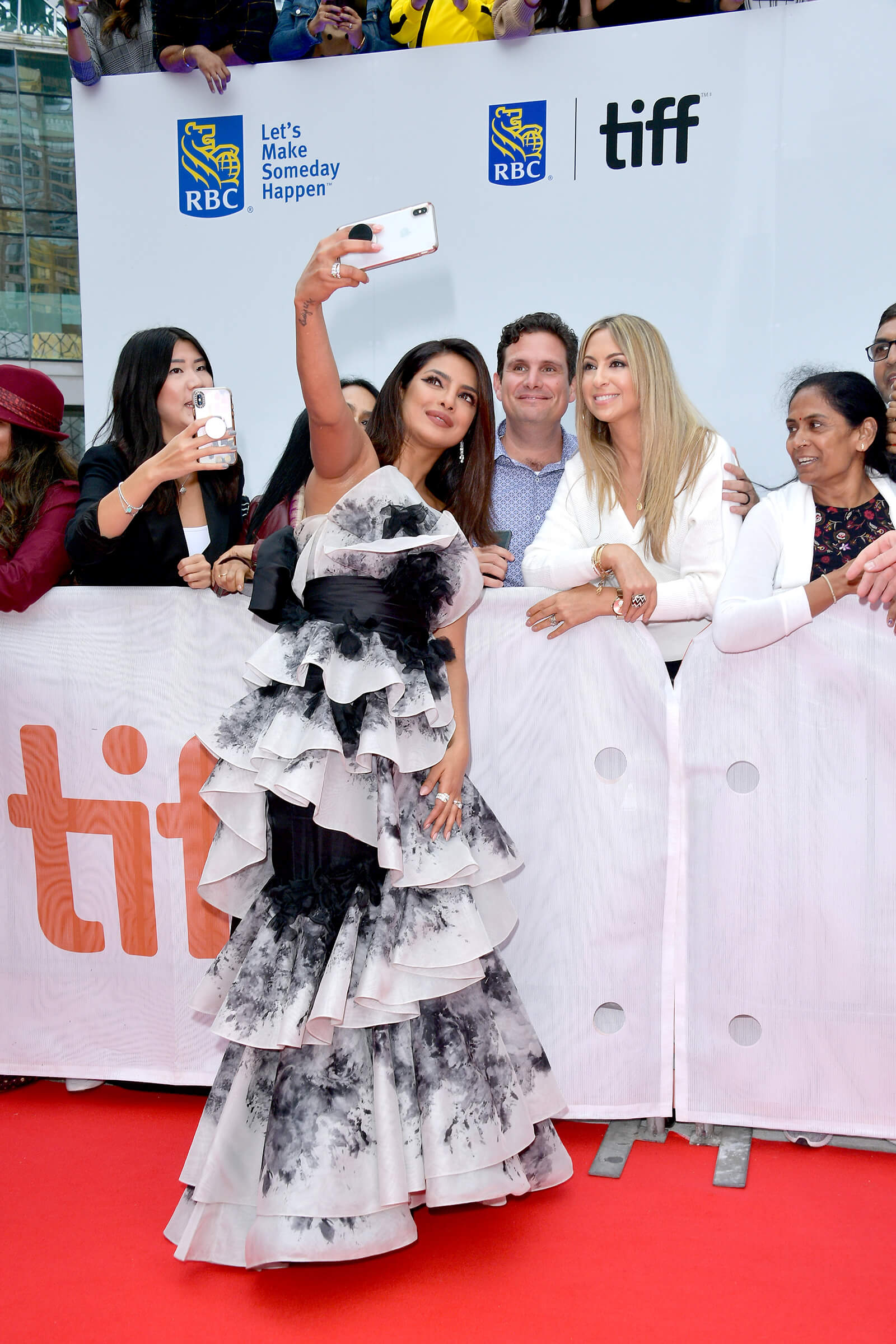
MC: Farhan, what drew you to this project?
Farhan Akhtar: A couple of things. One, of course, was an incredible script. And also a bit of actor’s greed to work with a director like Shonali. I had seen Margarita With a Straw, loved that film. I’ve worked with Kalki [Koechlin] in the past, and to see the kind of performance she extracted out of Kalki in that film, it’s something that every actor wants. You want someone to pull something out of you that maybe even you didn’t know existed. So when the script came together and Shonali was attached to it, I just immediately said yes.
MC: So did you feel like the film pushed you to a new place as an actor?
FA: The thing is, it’s easier to create characters that are larger than life, that are somehow fantastical. But if you want to play someone who’s very, very real, it actually can be more tricky than you imagine. For that, you need a person behind the camera who’s watching you very intently, with a lot of love and with a lot of understanding of what the character needs, and be able to communicate with you constantly and keep you on that path. Because we tend to have a certain flair for drama [laughs], so I find that very, very tricky to do. To me, that’s the challenge, is to be as real as possible in a film that genuinely requires that, and not try to fall back or create something that would seem an amazing moment in the film but somehow doesn’t ring true to what a character like Niren would do.
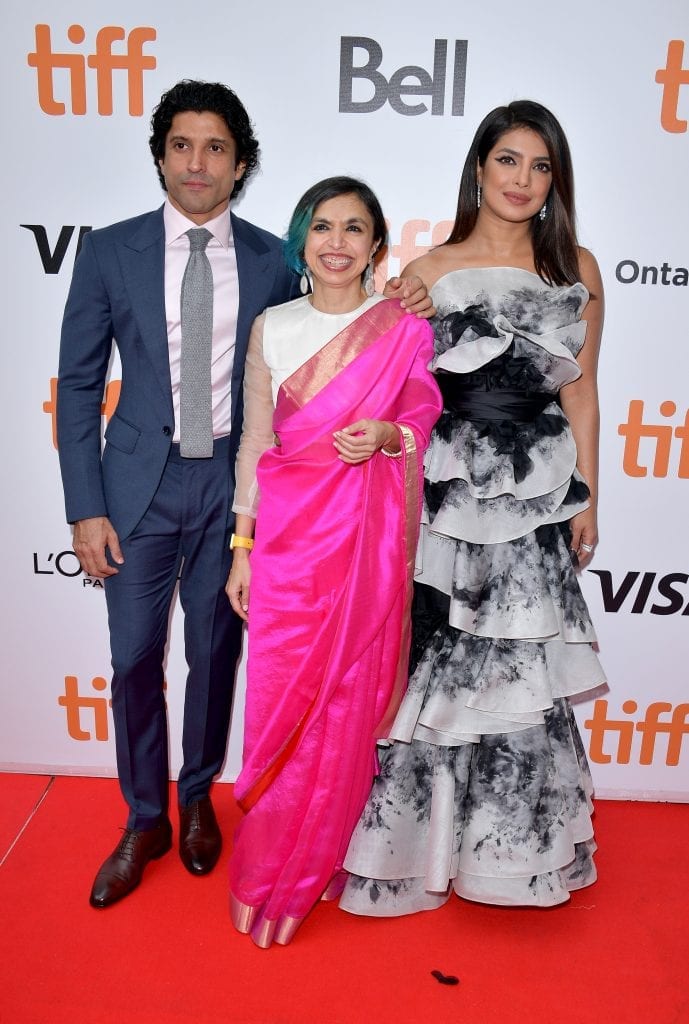
MC: Being a father yourself, I can’t imagine it was a big stretch to put yourself in Niren’s mindset . . .
FA: I do relate to, as a parent, the fear of something happening to your child. My younger one, when she was just about a year old, she was very sick, couldn’t keep any food in, was crying all the time. We took her to the doctor [and] there was something wrong with her intestine; it’s called a telescoping intestine, where the small intestine kind of goes backwards into the larger one, which could be fatal. And I remember that journey from his clinic to the hospital, and my world was just falling apart. The word “fatal” stuck in my head . . . maybe it was half an hour, 45 minutes, we got to the hospital and they said, “Please don’t worry, it’ll be fine.” Living with that feeling for six years as parents, that anything can happen at any given point to your child suddenly, that was something that really, really made me take this seriously and respect these parents. It’s very difficult to go through what they went through, but to go through it and give her this absolutely beautiful life knowing that it’s going to come to an end very soon was very inspirational.
MC: To find moments of happiness while living under such a dark shadow . . .
FA: There was a film made in, I think, the ’60s in India about a man who was dying of cancer. And there was a line in that film which is very applicable to this film. He says that life doesn’t necessarily need to be long, but it should be grand [laughs].
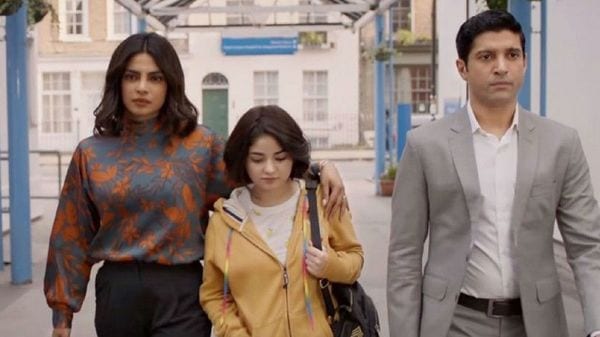
MC: Priyanka, last year TIFF artistic director Cameron Bailey made the 50/50 x 2020 pledge for gender parity at the festival. As a producer and an actor, you’re a champion of female filmmakers. How close are we to realizing the goal of parity in the industry as a whole?
PCJ: It’s amazing and wonderful to see people like Cameron Bailey and many others in the entertainment industry who have actually set the goals. Because otherwise . . . there might be opportunities that are being created for women, but will they last, how many women will they reach, what do you have to do to be able to reach that opportunity? When will it become normal? When will we say “filmmakers” and not “female filmmakers,” when will we say “athletes” and not “female athletes”? That is when the change will be real. Making sure opportunity is something every child has the right to, male or female — if we make that our basic rule, then I think we will be able to take steps that are actually tangible, not just a conversation.
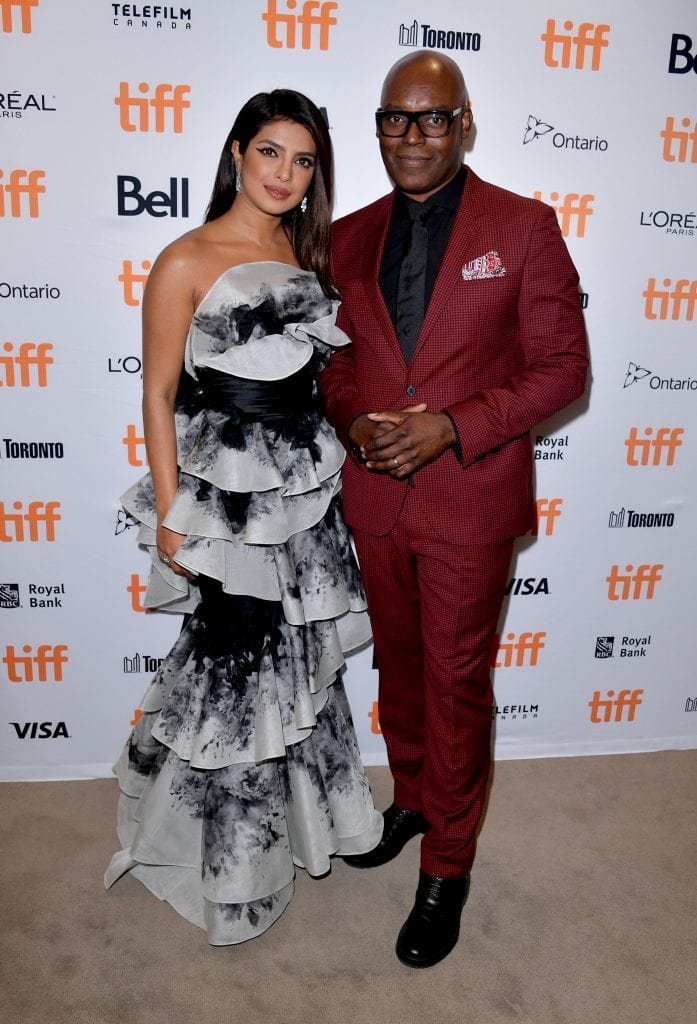
MC: Farhan, as your career has gone on, have you found yourself looking for different things out of your film projects?
FA: Honestly speaking, I think I’ve always tried — be it in films I’ve directed or films that I’ve produced or films that I’ve acted in — to somehow find some elements of truth. And by that, I don’t meant it has to be a real film or about real people; even if you take a film that’s as out-there as an Avengers movie, at the heart of it there is some truth, and to me, that truth is important. As long as I can connect to that, as long as there’s something in there that can be related to on a human level, with human emotions that make you feel a certain way, that make you think about something, if that can happen, more often than not I’ll end up saying yes. But if it’s just a film that, you know, “We’ve got amazing action sequences and we’ll be shooting it in Mexico,” to me, that’s not exciting at all.
MC: Priyanka, you’re quite well-established in both Bollywood and Hollywood now. Does it ever feel like you’re juggling two separate careers?
PCJ: Not anymore . . . It did initially when I first came to the U.S. Being on a network TV show [ABC’s Quantico] was 11 months a year, 12 months a year; at that time, I didn’t have the ability to do [much acting work in Bollywood]. I started producing in India [and] I was feeling like I was juggling two careers. But now that I’m doing features here and features there, I’m doing work in both countries; I’ve always felt that they don’t need to be mutually exclusive. The world is a really, really small place now, and I’m an amalgamation of the East and the West as a person, so wherever my work takes me and wherever people want to watch me, that’s where I go. I’m very global.
Main Image Photo Credit: George Pimentel/Getty Images
Matthew Currie
Author
A long-standing entertainment journalist, Currie is a graduate of the Professional Writing program at Toronto’s York University. He has spent the past number of years working as a freelancer for ANOKHI and for diverse publications such as Sharp, TV Week, CAA’s Westworld and BC Business. Currie ...



































































































